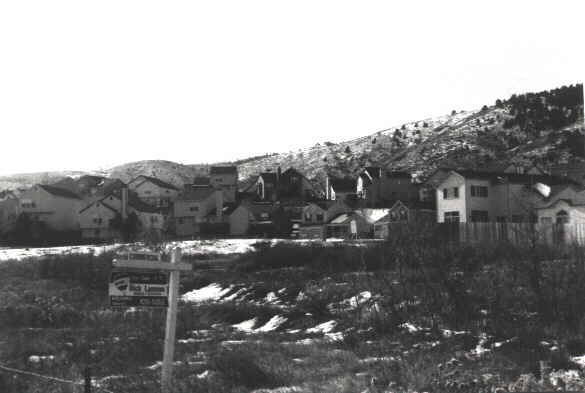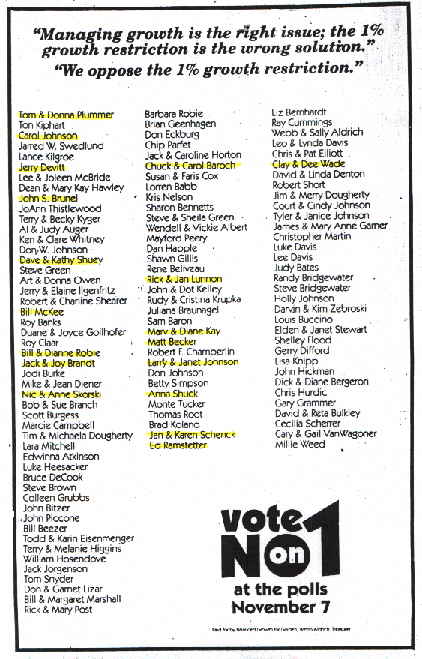Boosters Unite to Fight the 1% Growth
Ordinance

|
By the
summer of 1995
Golden's citizens had had enough suburban sprawl and enough
of a City Council that seemed unwilling or unable to do
anything about it. It was time for a petition. It was time
for some law. It was time to get the Golden City Council to
do what the community was asking them to
do.
The developers and their friends
shuddered and them organized to prevent the people of Golden
from performing so rash an act as to prevent
them from making a killing on real
estate speculation. It was unconscionable. It portended
doom. It was un-American. It meant. . .
accountability to the community!
Join GOLDENCO.ORG on a stroll down
memory lane and watch as our booster friends pull out all
the fiscal and rhetorical stops to oppose a limit on
residential growth that voters ultimately approved by a
landslide. Don't forget to click the
links.
|
Webb
Aldrich (Golden), "City
Will Do 'Fine' Without Growth Limit," The Golden
Transcript, Guest Column, 12 September
1995
Growth! Smart growth, NO growth, slow growth,
controlled growth. What are we going to do about it?
These are the topics on every tongue in town. There is no
doubt it is THE ISSUE in Golden today. Most of the recent letters
written to this paper have addressed this issue, and most of them
have been very emotional.
I am as concerned as anyone about the increased traffic,
the stresses on our schools and infrastructures, and the threat to
our small town way of life.
However, I am also concerned about the direction some of
this emotion is taking us. I think it's time for a deep breath,
some careful consideration of current growth limitation proposals
and a good dose of our "small town" common sense.
Now what's got us all riled up is the current grading and
construction of the Canyon Point development. It looks
terrible!
|
But the fact of the matter is the Beverly Heights
subdivision at the base of Lookout Mountain sits at a
higher elevation on our hillsides than Canyon Point does,
and in a few years, when trees and lawns are green, it
will look much better. Due to our geographic constraints
the remaining land for development in Golden is
minimal.
Given the dust on the hillside, the increased
traffic and all the frustrations that come with it, it
becomes easy to walk out of Safeway and put your
signature on a petition to limit growth. I understand how
it can seem like the thing to do. Consider for a moment
some of the unintended consequences a 1% limit on growth
will create.
First of all, the notion of passing a law limiting
growth suggests that this is a problem the citizens of
Golden can's handle on their own, that it's so out of
control that it needs to be regulated. I think
not
I have been involved in this community for some
time, and I have a tremendous amount of confidence in our
ability to deal with any issue that comes our way through
dialogue and collaboration, not regulation.
|

|
The proposed 1% growth limitation states, "Building permits
shall be allotted so that those issued in 1996 and thereafter
shall result in no more than 1% annual increase in the number of
all dwelling units."
Who gets to be the lucky 1%? Is it the first 1%? The
richest 1%? And how can anyone know what our growth needs will be
from "1996 and thereafter"? That's a long time. Nobody's crystal
ball is that good. The proposal is poorly thought out.
Consider also the effect this will have on the
unincorporated areas surrounding our town. the severe restrictions
of a 1% limitation would discourage annexation into Golden and
open the door for Lakewood and Arvada to define our boarders. So
the growth you fear happens anyway, and we have lost
control.
The stated intention of this proposal is not to limit
commercial or industrial growth, but that's exactly what will
happen. Would companies considering coming to Golden, perhaps
bringing good jobs (more than minimum wage) come here if there was
not adequate housing for their employees?
It would also significantly raise housing costs. How would
this effect the elderly or those of lower income who would like to
live here? Would your children be able to afford to live in the
town in which they grew up?
Developers and builders don't create growth, they simply
supply a product created by demand. Growth is caused by the fact
that we choose to have children, those smiling faces that are our
future. Would you limit that? Would you deprive them of the
American dream of owning a home in Golden?
The passage of a 1% growth limitation will almost certainly
cause the city of Golden to be sued by powerful groups
representing the building industry. These people are not going to
let this type of limitation go unchallenged. This could cost us
hundreds of thousands of dollars in legal bills, bills that you
and I have to pay.
Maintaining our small-town atmosphere is not going to be
accomplished by passing a law. It is up to us to do that, by
working together to create a balanced community. I think we'll do
just fine.
Webb
Aldrich (Golden), "Growth
Initiative is 'Just Plain Wrong,'" The Golden
Transcript, Guest Column 31 October
1995.
Now that much debate has been conducted on the 1%
growth limitation, it becomes easy to vote "no" on ballot
initiative No. 1. Clearly, this is no solution to the problems
Golden is facing, such as the threat to our hillsides and the
increased traffic. Having become informed, may Golden Residents
have told me they initially favored the measure but have since
changed their minds.
This is not the first place growth limits have been tried.
Our neighbor to the north, Boulder, has limited growth to 2% with
exemptions for some types of housing, and the results have been
disastrous. They have not solved the problem with these limits,
only forced growth to their borders and increased traffic and
forced housing to be completely unaffordable. The average price of
a home in Boulder is $238,000.
Why should Golden, having witnessed the failure of growth
limits in Boulder, repeat this mistake? In fact, make it worse by
passing a measure that is even more severe?
It is the severity of this measure that you must consider.
It is a train wreck. It is ill-conceived. It is irresponsible. It
is dysfunctional. "Limit building permits to 1% in 1996 and
thereafter." No time limits. No grandfathering clauses for lots
already approved to prevent lawsuits. No nothing. NO WAY.
This initiative, if approved, will never hurt people who
have not already moved to Golden. They will just move elsewhere.
This will hurt the people who already live here. This hurts
us.
I have challenged the authors of this initiative repeatedly
to address the issues of increased housing costs, increased taxes,
certain lawsuits, a rush on building permits and all the other
unintended consequences that must occur. Their response is,
"Houses and taxes are already high." So what's their point? That
things are already so bad it's OK to make them worse?
The truth of the matter is they don't have a good answer.
They don't want to be confused by the facts. They claim this "will
lend predictability to the planning process." Hogwash. The concept
is just a warm, fuzzy feeling embraced by people with no business
sense or experience. I wish I could impose some regulation on my
business that would make it "predictable," that would be
wonderful. But, alas, the market is cyclical, up and down, good
times and bad. Always has been, always will be.
I know this appeals to many of you on an emotional level,
that you feel something must be done to curb this growth. Would it
surprise you that I feel that way too? Something must be done. But
not this thing, not this 1% limit on permits. This is just plain
wrong.
We need a hillside protection plan. We need the 470 link.
Maybe moratoriums on new projects for a while. I would be willing
to donate my time to work on a better plan.
Vote on Nov. 7. Vote informed. Vote with your brain, not
your emotion. Send the authors of this initiative back to the
drawing board to come up with a better plan. Urge them to include
more diversity in their group, like local businesses and community
leaders. Let's make sure we get responsible measures on the
ballot. Do the right thing on election day. Vote no on initiative
No. 1.
Webb
Aldrich (Golden), "Letter
to the Editor," The Golden Transcript, 2
November, 1995
In response to Mr. Parker's letter on the "sleazy"
phone call he received, I can only guess that Mr. Parker has a
very thin skin. There is nothing wrong with conducting a telephone
survey in a heated political campaign.
There were no misleading or untrue statements used in this
survey. It is no different from our flyers, newspaper ads,
letters, or yard signs. We are merely presenting a position on the
issue.
Mr. Parker's assertion that people who were surveyed are
"victims" who have been "misled" suggests that you do not have the
intelligence to make up your own mind on the issue.
Let's be clear. We think passage of the 1% growth limit is
a disaster for Golden. We have presented clear and logical
arguments why we think so. Are we trying to convince you that this
is the wrong solution? You bet we are.
John
Brunel (Golden) "Letter to
the Editor," The Golden Transcript, 2
November 1995
Contributions to political issues and campaigns are
filed with the city clerk and are public record. You
can check on the contributions being made on both
sides of the 1% growth issue.
While most of the donations made to Balanced Growth for
Golden, the group led by Webb Aldrich, a Golden resident, were
made by local citizens and businesses, I was appalled to find that
the group which favors the 1% limit, the Committee to preserve
Golden, was totally funded by Daniel M. Hayes of Arvada.
Why is this man, who doesn't live in our town, spending so
much money in an effort to limit growth in Golden? You must
question the motives involved here. Is the self-interest of one
person, who lives in Coal Creek Canyon, in the best interest of
over 14,000, who live in Golden?
While it is true that Aldrich's group has received some
funding from local Realtors (sic) and builders, I would much
rather they donate to the "No on 1%" campaign than to their
corporate lawyers to sue the city of Golden, which seems likely
should this inappropriate limit be passed. Vote no on 1% growth
limitation #1. And to those people
who do not live or work here, who spend who spend
their money to influence events in Golden for their own selfish
reasons, I say, Butt out."
Rick
Lunnon (Arvada), "Letter
to the Editor," The Golden Transcript, 26
October, 1995
While we are all frustrated with the
complexity of growth issues, Ballot No. 1 is errantly
misdirected.
Controlling population growth by limiting the
housing supply makes no more sense than limiting the
production of food or the manufacture of cars. Under
Ballot Issue No. 1, Golden would be forced to refuse
housing to two out of three people. To whom would you
deny a home? A top national priority is provision of
adequate housing for our population. Sufficient housing,
complete with proximity to employment opportunities, is
the major component on any
"quality of life" survey and critical to
reducing vehicular miles traveled with corresponding
reduction in pollution and increased safety.
Statewide surveys indicate that traffic is perhaps
the major community concern with population
growth. Restricting home ownership, raising taxes,
impacting operating expenses, and creating more
government bureaucracy and waste are not the answer.
Timely completion of current infrastructure and
transportation improvements is the answer.
Don't restrict the completion of Golden's plans.
Vote no on No. 1.
|

|
Bill
Robie (Golden Equities,
Inc.), "Letter to the Editor," The Golden
Transcript, 10 October 1995
The statement is made on a flyer put out by the
Committee to Preserve Golden, Dan Hayes, treasurer, promoting the
1% growth ordinance that "mistruths and emotional nonsense can
sway votes." This is certainly true and no one seems to be doing a
better job of it than Mr. Hayes.
The following are some prime examples from the "Green
Outside Golden" letter by Mr. Hayes printed in the
Transcript Sept. 28.
1. "If
Golden grows anymore, a very costly new
water
treatment plant will be needed as this one is running at full
capacity." Not correct. The present plant capacity is rated at
12.5 million gallons per day and this past summer had a peak day
use of around 9 million gallons per day. The surplus translates
into a capacity to serve about 5,000 additional people.
2. "Purchasing a $500,000 fire truck means the higher cost
of city services has already begun." Again false. The new truck
authorized for purchase by City Council is a scheduled replacement
for a truck that is 20 years old. It is being acquired
specifically for large commercial and office buildings such as
those at Coors and Jefferson County and would normally never be
used in residential situations.
3. Golden
Equities is 'just another name for the Adolph Coors
Company's real estate division" and are "inexperienced home
builders." Golden Equities, Inc. is a small, full service real
estate company formed under ACX
Technologies, a publicly traded corporation separate
from Adolph Coors Co. We don't build houses. Mr. Hayes is right
when he states that Golden Equities is the developer of Canyon
Point.
Let's have a fair discussion of the issue and try to stick
with the facts.
Clay
Wade (Lakewood), "Letter
to the Editor," The Golden Transcript, 26
October 1995
Supporters of the 1% building permit ask: "How does
growth benefit the average Golden citizen?" That question has
clear and important answers.
Possible the supporters either were not here or do not
remember who Golden was dying economically in the 1980s. Many
downtown stores were vacant, the streets, utilities and parks were
deteriorating and no new businesses were moving into town. When
the city would try to attract new business or industry, the answer
was always the same: "Sorry, but Golden lacks enough people to
support our business." Today, the downtown rebirth is evident, and
new companies are coming to town. A strong business tax base means
more tax dollars to improve the community. This renewed economic
vitality would not have taken place without an increase of new
homeowners to support those businesses.

|
New homes contribute financially and
aesthetically to the town in very direct ways. When
most of Golden was developed before the 1970s there
were no requirements to dedicate park or school land
or to make drainage improvements. As a result,
historic Golden lacked these basic features which are
taken for granted today. Since the 1970s new
residential developments have added significant park,
trail and open space land to the city system for the
use and enjoyment of everyone, and drainage
improvements to reduce flooding through town.
|
Heritage Dells park, parkland in the Canyon Point
community, and major open space areas in Mesa Meadows and Eagle
Ridge have been contributed to the city as part of these
development plans. Similarly, public use trails along the drainage
ways of Tucker Gulch, Cressmans Gulch and Kenny Run were required
as parts of these developments. As part of a recent subdivision
for the Golden Ridge condominiums, the city will collect a park
fee of $95,000 and a school fee of $180,000. the park fee will be
used to complete a portion of the 10-foot-wide bicycle trail along
Kenny Run, and the school fee will be held by the city until a
suitable project is agreed upon with the school district. Clearly,
modern residential developments make a much greater community
contribution, both financial and aesthetic, than older
developments.
Even more directly, new new residences in Golden have
improved the existing city utility system. The limited economy of
historic Golden did not provide for the routine replacement of
utility lines. Water and sewer tap fees for a new home today cost
$7,500; this is more than many older Golden homes cost to build
originally. The recent tap fee collections from new homes have
been used have been used to replace failing water and sewer mains
in the older portions of the community. These new residents paid
their "initiation fee" to Golden by replacing the 100-year-old
utility lines of their new neighbors! This influx of new money ten
allows the city to use its tax resources elsewhere to upgrade
streets and parks and to provide improved police and recreation
services.
In large part because of recent residential developments,
Golden today is in sound fiscal condition. A reasonable mix of
homes and businesses has created a balanced community which is
improving financially and aesthetically. Limiting residential
construction just as the market is slowing naturally will pull the
plug on the Golden miracle of rebirth, and send the town into
another cycle of economic decline. Don't kill the goose that is
building the Golden nest egg: support the continued improvement of
your community. On Nov. 7, vote no on ballot question 1 which
would limit residential building permits to 1% per year.
Advertisement:
The Golden Transcript, 2 November
1995

Town
Hall
Main
Menu




